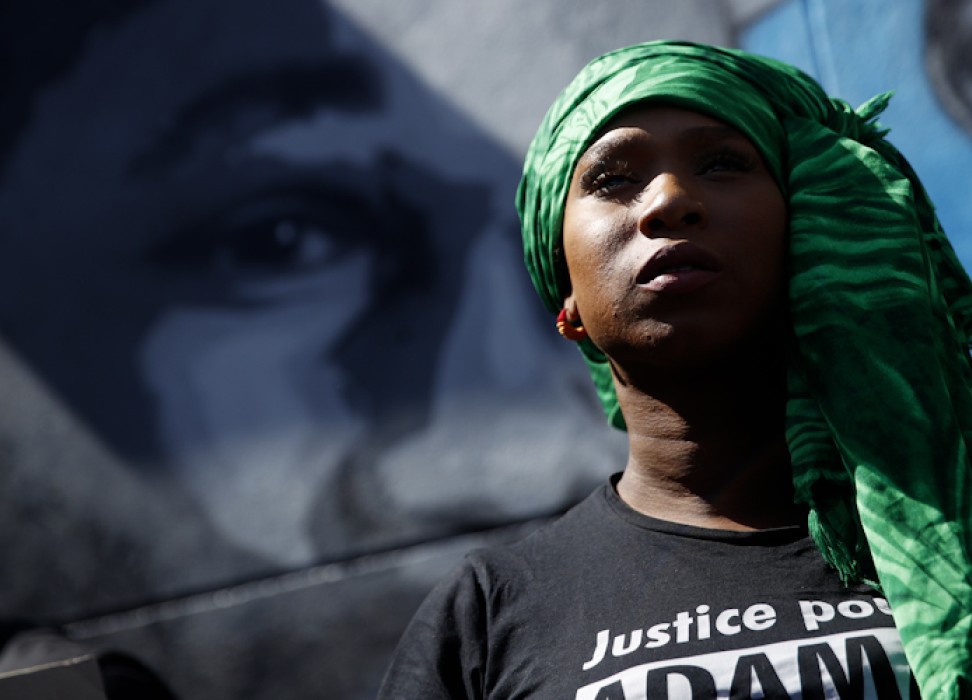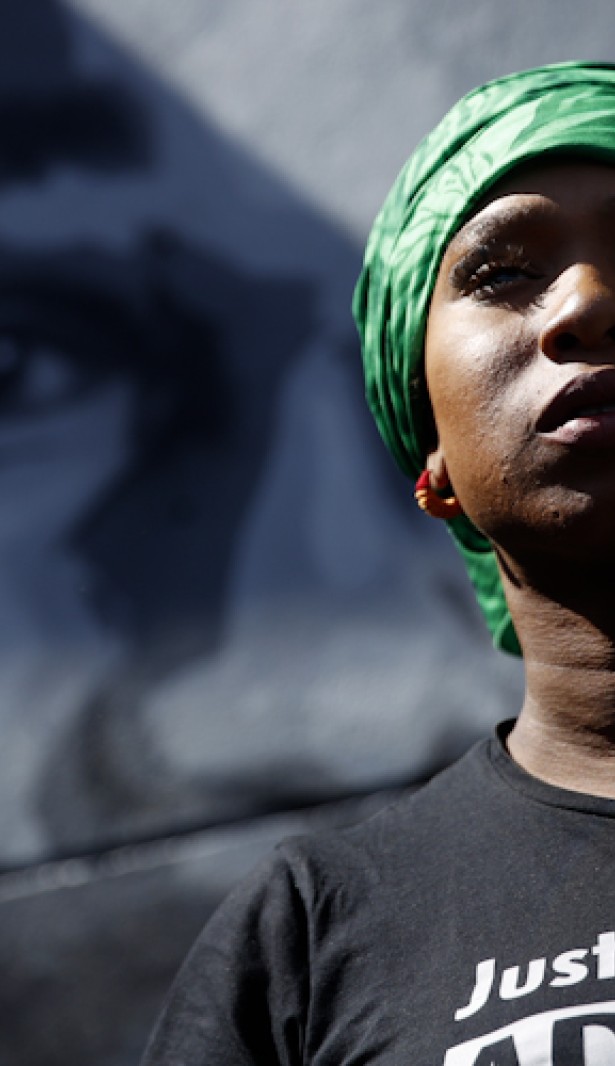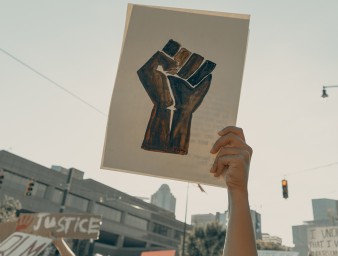"Your skin colour should never be seen as a weapon"
02 July 2021

After hearing the testimonies of the families of those who died during or after an encounter with law enforcement, High Commissioner Michelle Bachelet calls on States to"reimagine policing, and reform the criminal justice system, which have consistently produced discriminatory outcomes for people of African descent."
“I experienced a lot of pain, I think about my brother every day. I wake up in the middle of the night just wondering, what did he do that was so terrible that he had to lose his life?” said Philonise Floyd, the brother of George Floyd, an African-American man whose death at the hands of a law enforcement official in Minneapolis, Minnesota, United States, in May 2020, sparked worldwide mobilization against racism and police brutality.
“There is no reason that [people of colour] should be met with police brutality. They should be met with support, dignity and understanding, just like anybody else who they will want to pull over,” he added. “Your skin colour should never be [seen as] a weapon.”
Since his brother’s murder, Floyd has become a frontline advocate for racial justice and equality, speaking at an intergovernmental body for the first time in June 2020, during the “Urgent debate on systemic racism and police brutality in the United States” at the Human Rights Council.
Following the debate, the Council requested UN Human Rights Chief, Michelle Bachelet, to prepare a comprehensive report on systemic racism, violations of international human rights law against Africans and people of African descent by law enforcement agencies, accountability and redress, and Government responses to anti-racism peaceful protests.
Over 190 deaths with “striking similarities” in the past decade
For the preparation of the report, UN human Rights received information concerning over 190 deaths of Africans and people of African descent in contact with law enforcement officials mainly in Europe, Latin America and North America, and mostly in the past ten years. Most were men, the report stated – particularly young men from impoverished communities and men with psychosocial disabilities. Approximately 16 per cent were women, 11 per cent children and 4 per cent LGBTI people.
UN Human Rights’ analysis of these incidents suggests that over 85 per cent of deaths at the hands of law enforcement officials happened in three contexts: first, during the policing of minor offences, traffic stops and stops-and-searches, as in the case of George Floyd. The second context is when law enforcement acted as first responders in mental health crises, as in the case of Kevin Clarke in the United Kingdom. The third is during special police operations, as in the case of Breonna Taylor in the United States and the case of João Pedro Matos Pinto in Brazil killed during the so called “war on drugs” operations, and Janner García Palomino in Colombia also killed during a gang-related intervention.
The report highlights the emblematic case of Adama Traoré who died on his 24th birthday in July 2016 in France. Traoré appears to have ran away after witnessing his brother’s arrest and refusing an identity check by the police. Traoré was pursued and eventually found, restrained and arrested by law enforcement officers in an apartment. During the car journey to the police station, Traoré reportedly felt unwell and, upon arrival, the law enforcement officials placed him handcuffed in the yard where they called emergency services. Despite attempts to revive Traoré, he died that evening.
Traoré’s older sister, Assa Traoré has been campaigning for the truth and justice for her brother.
“What is most painful is the lack of consideration by the State when there is a death in the family, and the fact that the dead can be turned into media fodder and criminalized,” Assa Traoré said.
“When my brother died, I thought the police officers would be sentenced and sent to prison,” she added. “I never thought the struggle would be easy but I did not think it would take five years either. But the longer it took, the harder it became and I realised that we could not take justice for granted, that justice was not a right for us but rather that we had to fight to claim that right.”
Many of the families who shared having lost loved-ones as a result of an encounter with law enforcement expressed similar pain and feeling of injustice.
Luana Barbosa dos Reis Santos, was killed by military police in Ribeirão Preto, in São Paulo, Brazil, in 2016 at the age of 34. Barbosa dos Reis Santos was taking her son to class when they stopped on the way to greet friends in a bar. That is when they were approached by police.
“My sister was a black woman, lesbian, living in the suburbs - reason enough in Brazil to be stopped,” Roseli Barbosa said. “She refused to be searched by a police officer.”
Dos Reis Santos reportedly resisted being searched by a man, upon which three policemen allegedly beat her. Barbosa and her mother were called to the scene.
“We hid my sister for fear the police would come look for her and kill her, as they had said they would,” Barbosa said. “The next day we took her to the emergency hospital in Ribeirão Preto and, on 13 April 2016, Luana passed away.”
The death of Luana Barbosa dos Reis Santos was investigated by the Brazilian Civil Police, who requested the arrest of the Military Police officials who assaulted her.
“Everything in Brazil has been much slower, much more difficult. There could have been a virtual hearing to appeal the case, but there was no appeal, it was denied. So there was no justice,” Roseli Barbosa lamented.
Black communities feel threatened – not protected
In many of the incidents reviewed by UN Human Rights, the report states, the victims did not appear to pose an imminent threat of death or serious injury that would justify the level of force used. Further, racial bias and stereotypes associating people of African descent with “dangerousness” and “criminality” and racial profiling appear to play a recurrent role, shaping interactions of people of African descent with law enforcement and the criminal justice system.
These claims are confirmed by data that indicate, for example, that while in 2019 African-Americans comprised only 13 per cent of the US population, they accounted for 26 per cent of total arrests. In Canada, between 2013 and 2017, a “Black person in Toronto was nearly 20 times more likely than a White person to be involved in a fatal shooting by the Toronto Police Service.” Statistics by the UK Ministry of Justice revealed that between April 2019 and March 2020 “there were six stops and searches for every 1,000 White people, compared with 54 for every 1,000 Black people.” In Brazil, in 2019, people of African descent reportedly represented 79 per cent of deaths during police interventions.
These figures support the concerns, raised during consultations for the preparation of the High Commissioner’s report, on “the excessive policing of Black bodies” that make communities feel more threatened than protected.
The report highlights further that law enforcement officials are seldom held accountable for the crimes and human rights violations they commit against people of African descent, in part due to “deficient investigations, a lack of independent and robust oversight, complaint and accountability mechanisms, and a widespread “presumption of guilt” against people of African descent.”
A path to ending impunity for violations by law enforcement
In her report, UN Human Rights Chief, Michelle Bachelet, proposes a way forward to end impunity for human rights violations by law enforcement and “closing trust gaps.”
This would entail, among other steps, adopting a human rights-based approach to policing and an institutional culture that is fully free from racism. “States should undertake profound introspections and encourage the participation and engagement of people of African descent and affected communities in order to reimagine policing and reform the criminal justice system”, the report states.
Bachelet further recommends that use of force policies and regulations of law enforcement be aligned with international human rights law, and robust measures taken to ensure accountability and redress for victims and their families. “This requires effective, impartial and timely investigations of allegations of unlawful use of force or other violations by law enforcement officials, with a specific focus on the possible role that racial discrimination may have played in the violation; imposing commensurate punishments; and providing guarantees of non-repetition.”
States are also called upon to introduce alternative methods to policing to respond especially to educational settings and as respondents to mental health crises and manage migration and borders. States should also collect and make publicly available comprehensive data disaggregated by race or ethnic origin, as well as by sex and other factors, with strict safeguards and in accordance with international human rights law.
“States must show stronger political will to accelerate action for racial justice, redress and equality through specific, time-bound commitments to achieve results,” Bachelet said.
2 July 2021
This story is the second in a four-part series presenting UN High Commissioner Bachelet’s Agenda towards transformative change for racial justice and equality. Each part highlights the historic specificities, the lived experience and current realities of people of African descent in several States.



